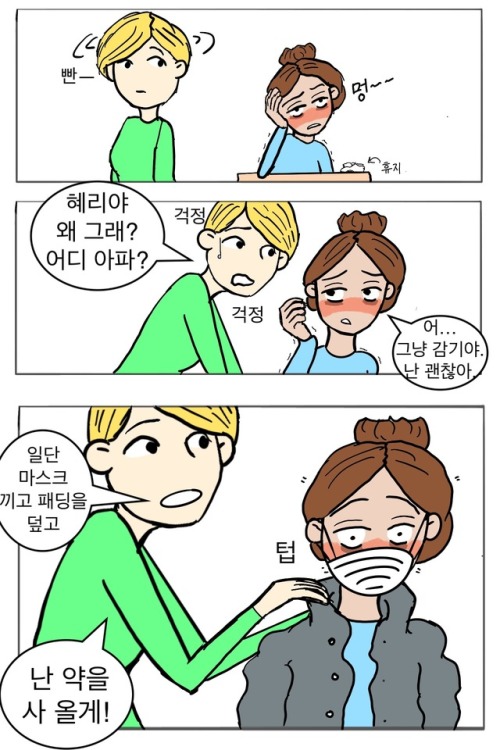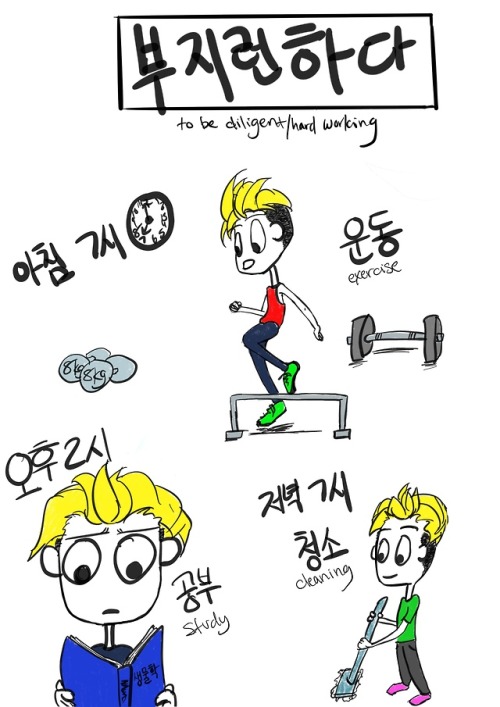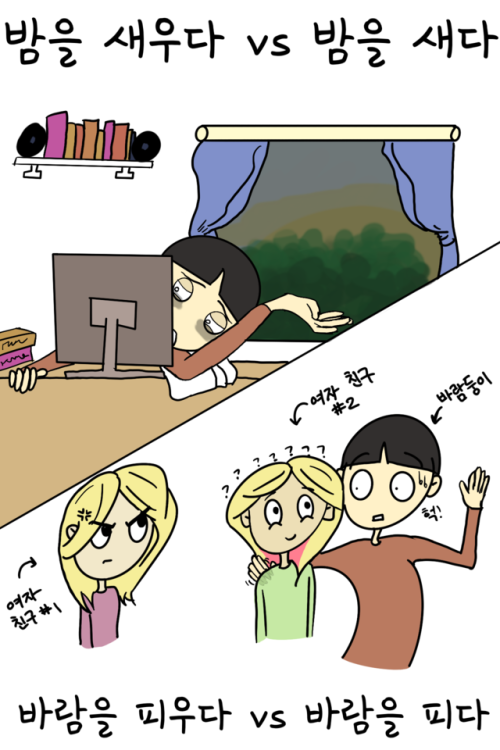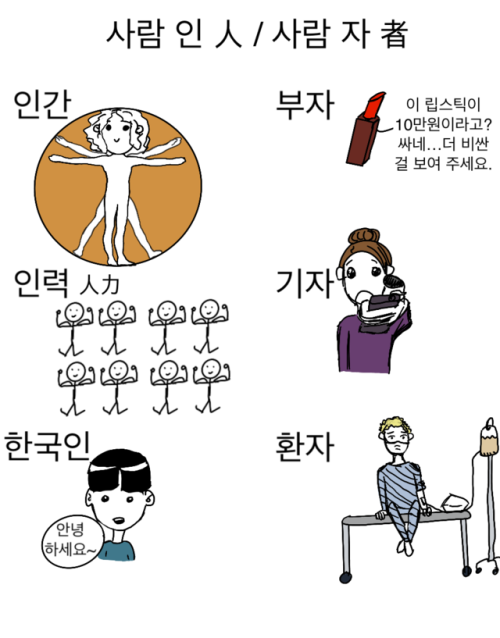#한국어 어휘
VOCABULARY LISTS: MASTERPOST
[Vocabulary by Topics]
-Vocabulary: Jobs (occupations 2)
-Vocabulary: School/School subjects
-Vocabulary: Positive Emotions
-Vocabulary: Airport, Airplane
-Vocabulary: Everyday objects at home
-Vocabulary: Electronic Devices
[Hanja, Idioms, Proverbs]
-Korean Proverbs and Vocabulary
-Learn Korean with Hanja - 화 (化)
[Vocabulary by parts of speech]
-Vocabulary: Active and passive verbs
updated 2021/03/19
Hello Everyone! This is Admin Sun with a survey on Korean dramas! We would really appreciate it if you could fill this out for us <3 All of us are Native Koreans, so we enjoy hearing foreigners’ opinions on Korean Culture and language! Also, if you’re learning Korean, please take the time to fill out our other survey for foreigners learning Korean <3 Thank you so much! Reblogs are very appreciated
Here’s a small vocabulary list based on words relating to dramas and surveys!
✎드라마 Drama
✎좋아하다 To like
✎주인공 Main Character
✎등장인물 Character
✎배우 Actor
✎대본 Script
✎시점 Point of view
✎촬영하다 To film
✎방송 Broadcast
✎영상 Video clip
✎보다 To see / watch
✎한국어 Korean (language)
✎대중 문화 Pop culture
✎대중 매체 Mass Media
✎문화 Culture
✎인기 Popularity
✎인기 있다 To be Popular
✎연예인 Celebrity
✎출연하다 To appear (in smth)
✎설문조사 Survey
✎배우다 To learn
✎응답하다 To answer
안녕하세요 여러분! Today I have a new kind of lesson for you all: it’s about Hanja! If you don’t know what Hanja is, it’s “Chinese characters borrowed from Chinese and incorporated into the Korean language with Korean pronunciation,” according to Korean Wiki Project. Korean words that feature the same borrowed character often have a shared meaning of some sort, which is why Hanja is good to know! If you know the meaning of one word with a character, you might be able to figure out another word with the same character without even using a dictionary!
To start this series of lessons, I wanted to start with the character 최; I got an ask about some words starting with it and thought it’d be helpful to make a short lesson about it :) I’m also going to post this on my Instagram soon as well, so go check it out there too! Let’s start!

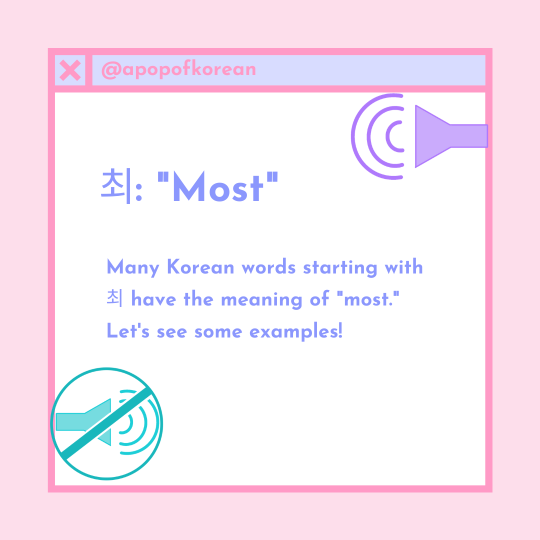


I hope this short list of words has been helpful – let me know what you think and if you’d like to see more of these! Maybe in the future I can break down the entire word – instead of just explaining what 최 means, for instance, I can explain what 애 means too, for example. Lmk your thought! See you in the next lesson! 다음에 또 봐요!
- My masterlist
- Joinmy Discord chat here to practice Korean with others!
- Follow me onInstagram herefor more Korean content!
- GetDrops Premium usingmy affiliate link to expand your Korean vocab!
- Check out myKo-Fi to support this blog and my studies! Thank you for your generosity!
안녕하세요 여러분! Hey everyone! I got a request for a vocab list about K-pop fandom-related words, so here it is! This is a combination of words you might use as a fan and some words related to being an idol. I hope it’s helpful :) Let’s start!
Nouns
- 가사 = lyrics
- 가수 = singer
- 그룹 = group
- (메인, 리드) 댄서 = (main, lead) dancer
- 리더 = leader
- (메인, 리드) 래퍼 = rapper
- 막내 = the youngest member of a group
- (메인, 리드) 보컬 = vocal
- 노래 = song
- 뮤직비디오 = music video
- 뮤비 is short for this.
- 멤버 = member
- 비주얼 = visual
- 밴드 = band
- 안무 = choreography
- 안무 연습 = dance practice
- 아이돌 = idol
- 연습생 = trainee
- 응원봉 = lightstick
- 인터뷰 = interview
- 앨범 = album
- (제일) 좋아하는 멤버 = bias
- 제일 좋아하는 멤버 literally means “favorite member” or “member you like the most.” I often just see 좋아하는 멤버 to mean the same thing, even though it literally means “member that you like.”
- 컴백 = comeback
- 콘서트 = concert
- 콘서트티켓 = concert ticket
- 케이팝 = K-pop
- 포토카드 / 포카 = photocard
- 팬 = fan
- 팬사인회 = fan signing event
- 팬클럽 = fan club
Verbs
- 덕질하다 = to be a die-hard fan of; to be really into
- 노래하다 = to sing
- 노래를 부르다 is another word for “to sing”
- 데뷔하다 = to debut
- 녹음하다 = to record
- 연습하다 = to practice
- 응원하다 = to cheer on; to support
- 촬영하다 = to shoot; to film
- 춤을추다 = to dance
- 컴백하다 = to have a comeback
That’s about it for this list! 제일 좋아하는 밴드가 뭐예요? 코멘트 하세요! What is your favorite band? Leave a comment! See you in the next lesson! 다음에 또 봐요!
- My masterlist
- Joinmy Discord chat here to practice Korean with others!
- Follow me onInstagram herefor more Korean content!
- GetDrops Premium usingmy affiliate link to expand your Korean vocab!
- Check out myKo-Fi to support this blog and my studies! Thank you for your generosity!
안녕하세요 여러분! I got a request to do some possible questions and answers that you might come across if you’re auditioning to be a K-pop idol! I’m not entirely familiar with the audition process or what kinds of questions might be asked of you, but here’s a list based on what I found online. I think that in order to answer these questions in Korean, you should be familiar with beginner/upper-beginner and some intermediate grammar structures and vocabulary. Check out my masterlist linked below to find some lessons that might help you answer them! I hope this is helpful for any aspiring idols! Let’s start!
Questions / 질문
- 이름이 뭐예요? = What is your name?
- 어디에서 왔어요? = Where are you from?
- 어디에 살아요? = Where do you live?
- 몇 살이세요? = How old are you?
- 학교에 어디 다녀요? = Where do you go to school?
- 학교에 어디 다녔어요? = Where did you go to school?
- 무슨 언어를 하세요? = What languages do you speak?
- 노래한 지 얼마나 됐어요? = How long have you been singing for?
- 춤을 춘 지 얼마나 됐어요? = How long have you been dancing for?
- 랩을 한 지 얼마나 됐어요? = How long have you been rapping for?
- 무슨 악기를 하세요? = What instruments do you play?
- 왜 아이돌 되고 싶으세요? = Why do you want to be an idol?
- 가장 좋아하는 가수/밴드 누구예요? = Who is your favorite singer/band?
- 취미가 뭐예요? = What are your hobbies?
Answers / 대답
- 안녕하세요, 제 이름은 [name]입니다. = Hello, my name is [name].
- 저는 [country]에서 왔어요. / 저는 [country] 사람입니다. = I am from [country].
- 저는 [place]에 살고 있습니다. = I live in [place].
- 저는 [#]살입니다. = I am [#] years old.
- Use native Korean numbers when saying your age.
- 저는 [school’s name]에 다녀요. = I go to [school’s name].
- 저는 [school’s name]에 다녔어요. = I went to [school’s name].
- 저는 [language 1], [language 2]하고 [language 3] 합니다. = I speak [language 1], [language 2], and [language 3].
- 저는 노래한 지 [amount of time] 됐어요. = I have been singing for [amount of time].
- 저는 춤을 춘 지 [amount of time] 됐습니다. = I have been dancing for [amount of time].
- 저는 랩을 한 지 [amount of time] 됐습니다. = I have been rapping for [amount of time].
- 저는 [year]년부터 노래했습니다 / 춤을 췄습니다 / 랩을 했습니다. = I have been singing/dancing/rapping since [year].
- 저는 [instrument] 연주합니다. = I play [instrument].
- [reason] 아이돌 되고 싶습니다. = I want to become an idol because [reason].
- 가장 좋아하는 가수는/그룹은 [name]입니다. = My favorite singer/group is [name].
- 제 취미는 [hobby]하고 [hobby] 입니다. = My hobbies are [hobby] and [hobby].
That’s about it for this list! Best of luck to you all :) See you in the next lesson! 다음에 또 봐요!
- My masterlist
- Joinmy Discord chat here to practice Korean with others!
- Follow me onInstagram herefor more Korean content!
- GetDrops Premium usingmy affiliate link to expand your Korean vocab!
- Check out myKo-Fito support this blog and my studies! Thank you for your generosity!
안녕하세요! Hey everyone! Here is yet another breakdown request fulfilled! If you have a song you’d like to see me break down, let me know and I’ll try to fulfill your request!
You can listen to this song here! I used Genius’s translationsandNaver Dictionary to help me out with this breakdown! I also linked my full-length lessons about the grammar structures featured in this song if you want to learn more about them. Let’s start!

사랑 촌스런 그 감정 / 근데 내 가슴이 뛰어 / 왜 나 이래 나?
Love, that old-fashioned feeling / But why is my heart racing? / What’s wrong with me?
- 사랑 = love
- 촌스런 -> from 촌스럽다, meaning “old-fashioned”
- 그 = that (must be placed before a noun)
- 감정 = feeling
- 근데 can usually be translated as “but” – it is sometimes used to draw attention to a different topic or something contrasting to what is currently being spoken about.
- 내 = my (informal)
- 가슴 = heart; chest
- -이 is a subject particle – more about particles here!
- 뛰다 = to run; to jump
- 왜 = why
- 이래 comes from 이렇다, meaning “to be like this” or “to do this.” This line literally means “why am I like this?” but can also mean “what’s wrong with me?”
나도 모르게 when you call my name / 가슴 아프게 나의 심장이 쿵쿵
Unknowingly, when you call my name / Heartbreakingly, my heart is pounding
- 나 = I/me (informal)
- -도 = too/even (depending on context)
- 모르다 = to not know
- Adding-게 to a verb or adjective stem turns it into an adverb. 나도 모르게 means “unknowingly” or, more literally, “without me even knowing.”
- 아프다 = to be sick; to hurt
- 나의 = another way to say “my.” -의 is a possessive marker.
- 심장 = heart -> This refers more to the heart, while 가슴 can mean either “heart” or “chest.”
- 쿵쿵 is an onomatopoeia and is supposed to mimic the sound of a heartbeat.
내 뜻대로 되지 않아 / 흔한 filter조차 없어
It’s not going my way / I don’t even have any trendy filter
- 내 = my (informal)
- 뜻 = meaning
- -대로 = according to [smth]; as [smth]
- 되다has a few different meanings. In this case, it’s a little hard to translate directly, but I would say it means “to go” (as in to go a certain way) or “to be done” (as in something is done some way).
- -지 않다= not / does not
- More literally, I think this line means “It’s not going according to my meaning.” As with a lot of K-pop lyrics (and Korean in general), it’s best to focus on the meaning rather than the literal English translation, so don’t worry too much if the translation sounds odd!
- 흔하다, according to Naver Dictionary, means “common” or “commonplace.” Not quite sure why Genius translated it as “trendy,” but I guess if something is trendy, it becomes common because everyone is using it.
- [noun] + 조차 = even [noun]
- 없다 = to not be there / to not have
That’s about it for this breakdown! I hope it was helpful :) See you in the next lesson! 다음에 또 봐요!
- My masterlist
- Joinmy Discord chat here to practice Korean with others!
- Follow me onInstagram herefor more Korean content!
- GetDrops Premium usingmy affiliate link to expand your Korean vocab!
- Check out myKo-Fito support this blog and my studies! Thank you for your generosity!
안녕하세요! Hello again everyone! I have yet another breakdown that was requested! If there’s a song you want to see broken down, let me know and I’ll try to fulfill your request!
You can listen to this song here! I used colorcodedlyrics.comandNaver Dictionary to help me translate these lyrics! I also linked my full-length lessons about the grammar structures featured in this song if you want to learn more about them. Let’s start!

거울 속에 마주친 얼굴이 어색해서 / 습관처럼 조용히 눈을 감아 / 밤이 되면 서둘러 내일로 가고 싶어
The face in the mirror is awkward / So like a habit I quietly close my eyes / When the night comes I want to hurry up and go to tomorrow
- 거울 = Mirror
- 속에 = Inside
- 마주치다 = to meet (usually refers to eyes meeting)
- 얼굴 = face
- -ㄴ/은allows you to describe nouns with that verb in the past tense. So 마주친 얼굴 literally means “the face that I met.”
- -이 is a subject particle – more about particles here!
- 어색하다 = awkward
- -아/어서 means “so” or “because.” 어색해서 means “because it’s awkward” or “it’s awkward, so…”
- 습관 = habit
- [noun] + 처럼 = like [noun]
- 조용하다 = quiet; 조용히 = quietly
- 눈 = eye(s)
- 감다 = to close (when talking about eyes)
- 밤 = night
- 되다 = to become (밤이 되다 literally means “to become night”)
- -(으)면 = if/when
- 서두르다 = to rush; to hurry
- 내일 = tomorrow
- -(으)로in this context means “to” or “towards.”
- 가다 = to go
- [verb stem] + 고 싶다 = I want to [verb]
설렘으로 차오르던 나의 숨소리와 / 머리 위로 선선히 부는 바람 / 파도가 되어 어디로든 / 달려가고 싶어 / 작은 두려움 아래 천천히 두 눈을 뜨면
My breath that rose up with excitement / And the wind that blows coolly above my head / I want to become a wave / And run anywhere / When I slowly open my eyes under the small fears
- 설렘 = excitement; thrill
- Here, -(으)로 means “with”
- 차오르다 = to rise up
- 나의 = my (informal) -> 나 means “I,” while -의 is a possessive marker.
- 숨소리 = breath -> refers to the sound of breath
- [verb stem] + 던is another way to describe a noun with a verb. It is used for actions that you used to do repeatedly in the past or that you did but did not complete.
- -와 = and
- 머리 = head
- 위로 = above; top
- 선선히 = coolly
- 불다 = blow
- 불다’s stem ends in ㄹ, which gets dropped when you want it to describe a noun.
- 바람 = wind
- 파도 = wave
- 어디로든 = anywhere
- 달려가다 = to run
- 작다 = small
- 두려움 = fear -> noun form of the verb 두렵다, meaning “afraid”
- 아래 = below; bottom
- 천천히 = slowly
- 두 = two (this is the word for “two” that you put before a noun)
- 뜨다 = to open (eyes)
휩쓸려 길을 잃어도 자유로와 / 더이상 날 가두는 / 어둠에 눈 감지 않아 / 두 번 다시 날 모른 척 하지 않아
I’m free even when I’m swept away and get lost / I won’t close my eyes / in the darkness that traps me anymore / I won’t pretend to not know who I am again
- 휩쓸리다 = to be swept away
- 길을 잃다 = to get lost
- -아/어도 = even though/even if
- 자유롭다 = to be free
- 더이상 = anymore
- 날 = me (informal)
- 가두다 = to trap; to confine; to lock up
- 어둠 = darkness
- -지 않다 = to not [verb/adjective]
- 두 번 = twice
- 다시 = again
- 모르다 = to not know
- -척 하다 = to pretend to [verb/adjective]
That’s about it for this breakdown! Hope it was helpful and fun to read! See you in the next lesson! 다음에 또 봐요!
- My masterlist
- Joinmy Discord chat here to practice Korean with others!
- Follow me onInstagram herefor more Korean content!
- GetDrops Premium usingmy affiliate link to expand your Korean vocab!
- Check out myKo-Fi to support this blog and my studies! Thank you for your generosity!
안녕하세요 여러분! Hey everyone! I got yet another request for a breakdown! If you have a song you’d like to see broken down, let me know! I linked my full-length lessons about the featured grammar points throughout as well in case you want to learn more about them!
I translated all these lyrics myself, but I did refer to this lyric videoandNaver Dictionary to help me out :) Let’s start!
나를 스쳐가는 그대 / 내 말을 들어줘 / 걸음을 멈추고 / 내 노랠 들어줘
You brush against me / Listen to what I have to say / Stop in your tracks / And listen to my song
- 나를 = me
- 나 is the informal way to say “I,” while -를 is an object particle. More about particles here!
- 스쳐가다 = to brush against; to pass by
- 그대 = you -> This is a poetic/romantic way to say “you” and isn’t really used in everyday spoken Korean.
- [verb stem] + 는 allows you to describe nouns with that verb. 나를 스쳐가는 그대 literally means “you who brushes against me.”
- 내 = my (informal)
- 말 = words
- 듣다 = to listen; to hear
- 듣다’s stem ends in ㄷ, so it becomes 들어줘 when conjugated.
- [verb stem] + 아/어주다 means that a verb is done forsomebody and can be used when pleading that someone do something for you. In this case, he’s commanding that you listen to him.
- Literally, this line means “listen to my words.”
- 걸음 = step(s) -> from the verb 걷다, meaning “to walk”
- 멈추다 = to stop
- -고 is a connector that means “and.” This line means “stop in your tracks and…”
- 노래 = song
축 처진 고개들과 / 비틀거리는 그림자 / 그렇게 나는 불청객이 돼 / 아무도 모르는 yeah / 노래를 부르며 yeah
Among the drooping heads / And staggering shadows / I become an uninvited guest / While I sing a song / That nobody knows
- 축 처지다 = droop; hang; sag
- 고개 = head
- Attach -들 to nouns to make them plural
- [verb stem] + ㄴ/은 allows you to describe a noun with that verb in the past tense. So 축 처진 고개들 literally means “heads that drooped.”
- 과/와is attached to nouns to mean “and” or “with.” 과 is attached to nouns ending in a consonant, while 와 is attached to those ending in a vowel.
- 비틀거리다 = stagger; stumble; falter; totter
- 그림자 = shadow(s) (it can still be implied that a noun is plural without the -들 depending on the context!
- 그렇게 = like that
- 불챙객 = uninvited guest
- 되다 = to become
- These lines were a little tricky to translate, but I think it essentially means “the drooping heads and staggering shadows, like that, I become an uninvited guest” as if he is an uninvited guest because the drooping heads and staggering shadows make him one.
- 아무도 = nobody
- 모르다 = to not know
- 아무도 모르다 sounds like a double negative – nobody doesn’t know. But in Korean, this is the correct way to say “nobody knows”! When using indefinite pronouns like 아무것도, 아무데도, (nothing, nowhere), etc., you need to use a negative verb like so.
- 부르다 -> when paired with 노래, means “to sing.”
- [verb stem] + (으)며means “while [verb]” and is used when two actions are happening at the same time.
아무도 모르는 / 노래를 부를래 / 지나가는 너의 / 마음을 붙잡을 수 있길 바라며
I’ll sing a song / That nobody knows / Hoping that I can grasp your heart / As it passes
- [verb stem] + ㄹ/을래(요) means “I will [verb]” or “I want to [verb].” It expresses a strong intention to do something.
- 지나가다 = pass; go by
- 너의 = your(informal)
- 너 means “you” (informal), and -의 is a possessive marker.
- 마음 = hear
- 붙잡다 = grasp; grab; hold
- [verb stem] + ㄹ/을 수 있다 = can [verb]
- [verb stem] + 기를 바라다 = to hope that [verb]
- Those last two lines literally mean “while hoping I can grasp your passing heart.”
That’s about it for this breakdown! Hope it was helpful :) See you in the next lesson! 화이팅!
- My masterlist
- Joinmy Discord chat here to practice Korean with others!
- Follow me onInstagram herefor more Korean content!
- GetDrops Premium usingmy affiliate link to expand your Korean vocab!
- Check out myKo-Fi to support this blog and my studies! Thank you for your generosity!
안녕하세요 여러분! Hey everyone! I have another Hanja lesson for y’all today – this one is about two possible meanings of 악! I’m planning on posting this to my Instagramtomorrow as well, so be sure to follow me there for more Korean content! I hope this is helpful, and you can let me know if you have any questions! 화이팅!
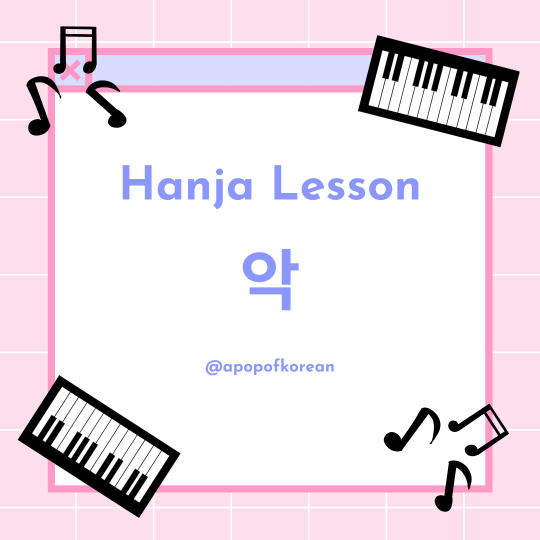
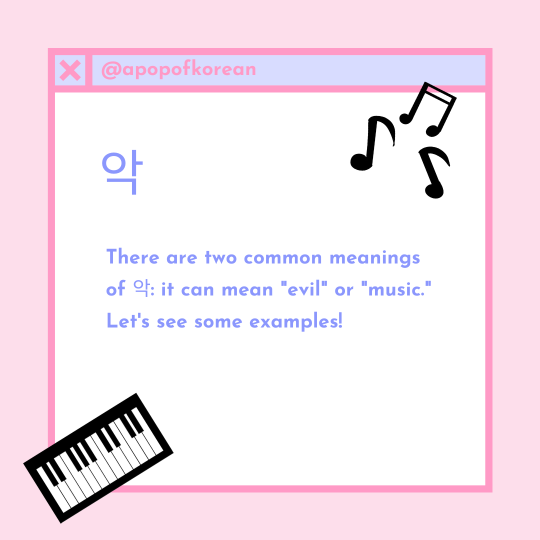
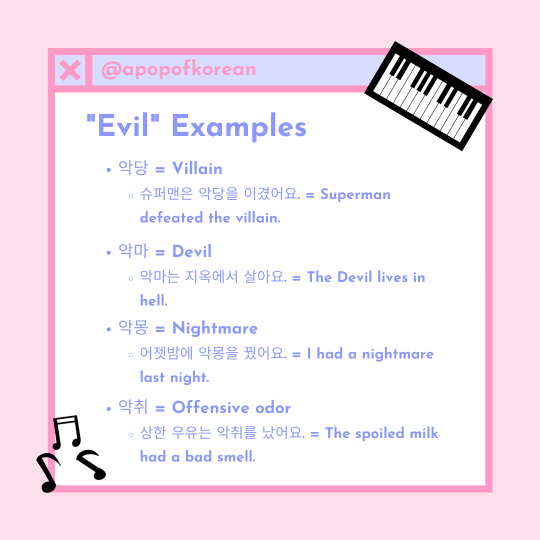
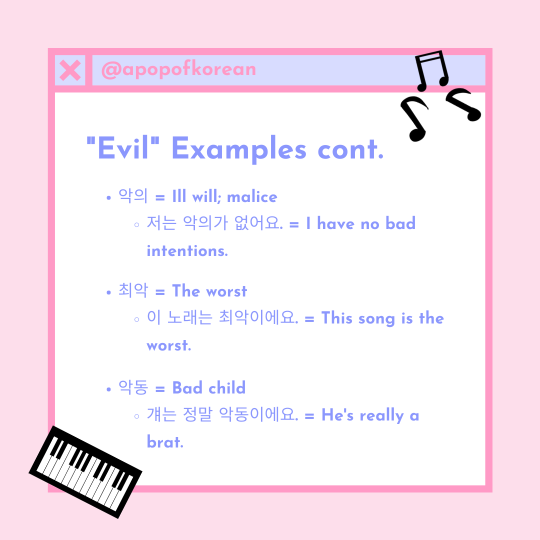


- My masterlist
- Joinmy Discord chat here to practice Korean with others!
- Follow me onInstagram herefor more Korean content!
- GetDrops Premium usingmy affiliate linkto expand your Korean vocab!
- Check out myKo-Fi to support this blog and my studies! Thank you for your generosity!
안녕하세요 여러분! I have another Hanja lesson for y’all – this one is about 수! This lesson doesn’t list every single possible meaning of 수, but these are some common ones. You can find this post on my Instagram as well; be sure to follow me there for more Korean content! I hope this is helpful!

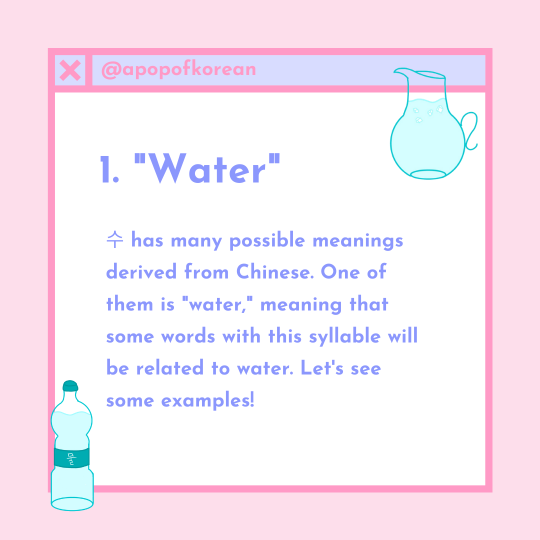
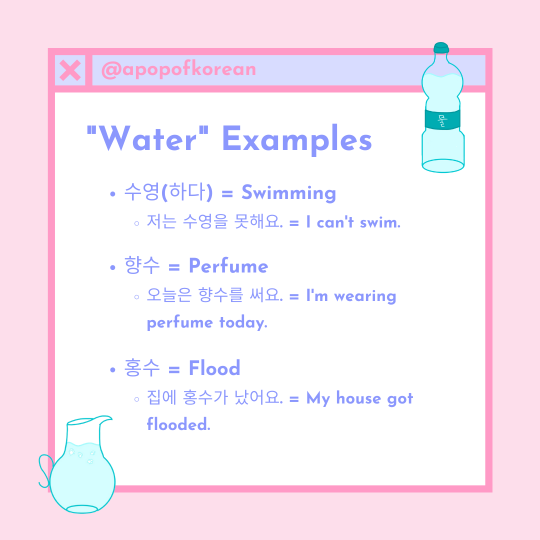

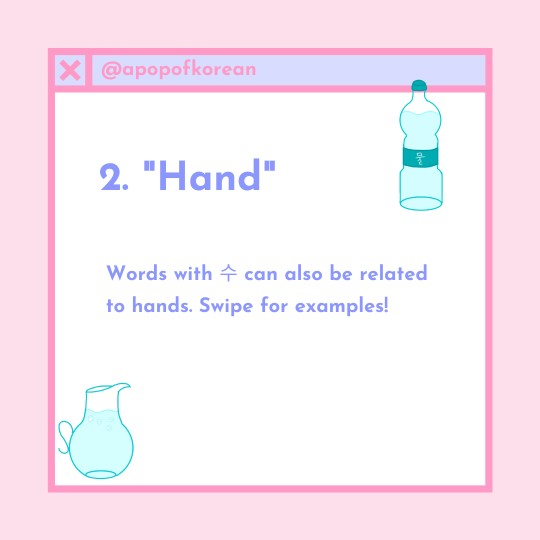
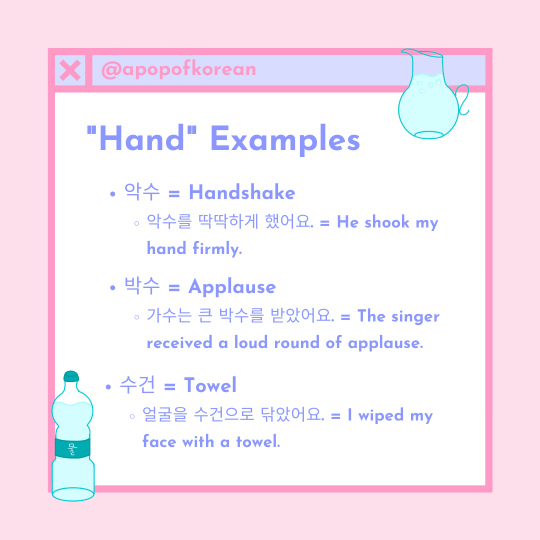
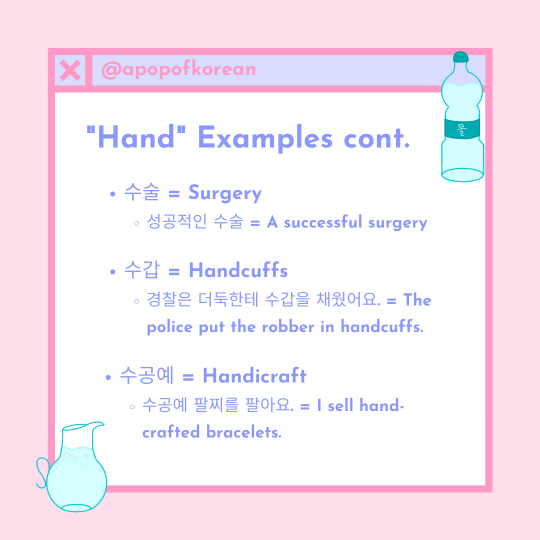

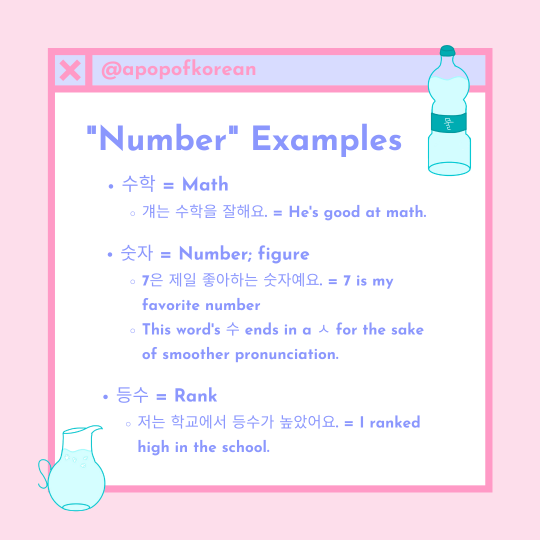
- My masterlist
- Joinmy Discord chat here to practice Korean with others!
- Follow me onInstagram herefor more Korean content!
- GetDrops Premium usingmy affiliate link to expand your Korean vocab!
- Check out myKo-Fito support this blog and my studies! Thank you for your generosity!
VOCABULARY WORDS #2 (어휘)
Family - 가족
Grandfather - 할아버지
Grandmother - 할머니
Father - 아버지
Mother -어머니
Younger brother - 남동생
Younger sister - 여동생
Son - 아들
Daughter - 딸
Husband - 남편
Wife - 아내
Younger sibling - 동생
(from a male perspective)
Older brother -형
Older sister - 누나
(from a female perspective)
Older brother - 오빠
Older sister - 언니
Interrogative pronouns
Who - 누구
Who - 누가 (누구+가(subject marker))
What - 무슨
Personal pronouns
My - 나의 / 내 /제
Our - 우리
(honorific)
This person - 이분
That person - 그분
That person - 저분
Other helpful vocabulary words:
Company - 회사
To work for / to go to - 다니다
Flower - 꽃
Rose - 장미
Library - 도서관
Morning - 아침
Nurse - 간호사
Counting unit for people - 명
College student - 대학생
To love - 사랑하다
to be right - 맞다
Really - 정말
Photograph - 사진
To be pretty - 예쁘다
To marry - 결혼하다
Last year - 작년
[ActiveKorean2]
anon asked: what’s the difference between 끊다 and 자르다?
Great question! Hopefully my answer helps! Both can mean “to cut” but here’s a better explanation:
One is used abstractly, while the other is used for more concrete situations. When you want to cut something for a recipe, or cut a piece of paper, you use 자르다. When you want to hang up the phone, or quit smoking, you use 끊다.
끊다 - cut (something abstract); not a literal cutting of something
- 이만 끊을게요 - I’ll hang up (on the phone)
- 앞으로 담배를 끊을 거예요 - From now on, I’m going to quit smoking.
자르다 - cut (something concrete); a literal cutting of something
- 종이를 반으로 자르세요 - cut the paper in half
- 이렇게 잘라야 해요 - you should cut it like this
- 머리 잘라서 머리가 짧아졌어요 - my hair got shorter because I cut it
Hope that helps! Happy learning :)
~ SK101
Translation:
새벽 3시 - 3am
3년동안 사귀었는데 카톡으로 갑자기 헤어지는 거 말이 돼애애? We dated for three years…does suddenly breaking up over text make any sense???
*This phrase is like “We dated for three years…and you break up with me over text?? WTF??” kind of anger. 말이 돼? is like asking “does that make sense” in a WTF kind of way. It doesn’t translate smoothly in English, but it’s a common expression in Korean.
흥분된 상태 - excited state
분노 - rage
——-
새벽 3시 - 3am
내일 너무 기대돼서 잠이 안 오네. I’m so excited for tomorrow that I can’t sleep. (“sleep isn’t coming”)
——-
흥분하다 is a word that many Korean students use incorrectly, and that’s because of the translation. 흥분하다 translates to “to be excited.” And, that’s because it means a sudden rush of emotion.
The problem is that many students want to say something like “I’m excited to go to Korea.” 저는 한국에 가는 것에 흥분해요. (X)
But, this is not how to express that feeling. There is a much better expression. 기대되다. Now, this word is translated as “to expect.” And while, it can be used to express expectations, it’s also used to express “Looking forward to”/“excited for something.”
This is also why many Koreans will say “I’m expecting it,” when they want to say “I’m looking forward to it.”
So, let’s look at how we can use these correctly.
흥분되다/하다
그 사람이 우리 언니를 욕하는 것을 듣고 흥분해서 싸울 뻔했어요. (After) I heard that person talk badly about my sister, I was so “upset” that I almost fought them.
*In this case, 흥분하다 could be seen as “upset.” A rush of angry feelings that made the heart race.
대학교에 합격한 걸 듣고 너무 흥분해서 도서관에서 소리를 질렀어요. (After) I heard that I was accepted into college, I was so excited that I yelled in the library.
괜찮아. 흥분하지 말고 일단 해결할 방법을 생각해 보자. It’s okay. Don’t get worked up, instead let’s think of a solution first.
흥분된 목소리 an excited voice
기대되다/하다
내일 한국에 가서 넘나 기대돼요. I’m so excited, because I’m going to Korea tomorrow.
오늘 데이트 해서 진짜 기대돼요. I have a date today, so I’m really excited.
내가 쓴 글을 기대하지 마. 완전 쓰레기야ㅋㅋㅋ Please don’t look forward to the thing I wrote. It’s completely garbage.
내일 캡틴 마블이란 영화를 볼 거야. 너무 기대돼. Tomorrow I’m going to see the movie Captain Marvel. I’m really looking forward to it.
Note: The difference between 되다 and 하다 is important when understanding these to words. Because 기대되다 and 기대하다 are slightly different. 하다 is used to refer to something that you are actively doing at the time you’re talking about it or in the past. 되다 typically refers to more passive actions or something that is true, but not necessarily using all your attention.
So, 기대되다 is being excited. You’re in that state passively.
But 기대하다 is a constant state of that excitement or expectation. Which is why we say 기대하지 마. Don’t be excited. Because it’s a little strange to say 기대되지 마 “Don’t become excited" in Korean. Because 되다 refers to something out of your control most of the time. That’s why it’s passive. So, it’s strange to say don’t “become” excited when you have no control over it.
Anyway, good luck everyone! 기대되다(to be excited for, to look forward to) is a great word to use. It’s used all the time. Unlike 흥분되다, which is not overly common in comparison. And also, 흥분 is used as “sexual excitement,” so, you don’t want to say 내가 흥분했다 in the wrong situation. It might become awkward.
Follow me for more Korean posts in the future. I have a new “guide” that I’m working on right now. So, I hope to finish it and give it to you guys to practice soon!
Post link
번역 - translation
1. *빤– *stare / *멍–stare into space/out of it / 휴지 - tissue
2. *걱정, 걱정 - worry, worry (worried, worried)
혜리야 왜 그래? 어디 아파? Hyeri, what’s wrong? Are you sick (somewhere)?
어…그냥 감기야. 난 괜찮아. Yeah…it’s just a cold. I’m okay.
3. 일단 마스크 끼고 패딩을 덮고 난 약을 사 올게! First of all, wear (this) mask and cover up with (some) padding, and I will go get some medicine.
*텁 - *places/puts*
Notes
*padding = fluffy/puffy winter jacket
*Noun을/를 사 오다/가다. = This is a rather common expression. I’ll buy something and come/go. It’s used often when buying something on your way to a different place or when you’re going to buy something and come back.
*배 고파? 뭘 사 갈게. Are you hungry? I’ll buy something and go./I’ll buy something on my way there.
Vocabulary related to colds.
감기에 걸리다 to catch a cold / 독감에 걸리다 to have(catch) the flu
김기에 걸렸어요. I caught a cold.
감기 끼가 있다 to have the feeling you’re coming down with a cold
감기 끼가 있어서 오늘 못 만날 것 같아요. It feels like I’m coming down with a cold, so I don’t think I can meet today.
목감기 sore throat (like when you have a “cold” but your only symptom is a sore throat) / 코감기 stuffy nose (similarly, when your symptoms are only a stuffy nose)
감기가 유행이다 this is technically “colds are trending,” but 유행하다 is used to express that something is common, so it’s a phrase to say that everyone is catching a cold these days.
요즘 감기가 유행이라서 조심하세요. Be careful not to catch a cold (since they are so common these days).
증상 symptom(s)
증상이 어떠세요?/어때요? What are your symptoms? (literally “how” are your symptoms?)
머리가 아프다 to have (your/someone’s) head hurt, to have a headache / 배가 아프다 to have (your/someone’s) stomach hurt, to have a stomachache / 열이 나다 to have a fever / 코가막히다(막혔다) to have a stuffy nose *often used in past tense*
어지럽다 to be dizzy / 기침하다, 기침나다 to cough / 코가 간지럽다 for (your/someone’s) nose to be itchy / 콧물(이) 나다 to have a runny nose / 몸살 나다 to ache all over one’s body (from a cold or fatigue) / 재채기하다, 재채기나다 to sneeze
Post link
Today, I thought we should add a new hanja to the list: 力 - 힘 력/역. So, 力 means 힘 (power) and it is pronounced as 력(역 when it’s at the beginning of a word - but that is less common). 력 is a very common hanja in Korean. So, it’s great to be able to recognize it when words have something to do with strength, power or ability (strength to do something).
Here are common words seen with 力(힘 력/역).
집중력 ability to focus / 기억력 memory (ability to remember) 노력 effort (strength to put in effort, try, work) / 폭력 violence / 권력 power, authority / 능력 capability (power to be able to something) / 협력 cooperation (ability to work together) / 매력 charm (power to captivate, charm someone) /실력 ability (power of a skill) / 체력 strength, stamina (strength of the body) / 창의력 creativity (ability to be creative) / 중력 gravity /시력 eyesight (strength of the eyes) / 이해력 ability to understand something
Here are some example sentences.
우와 10년 전에 일어난 일을 그렇게 잘 기억해? 기억력이 대단하네. Wow, you can remember that thing that happened ten years ago that well? Your memory is amazing.
노력하면 다 잘 될 거야. If you try(put in effort), it will all work out.
그 여자는 매력적이에요. That woman is really charming.
어제 밤에 클럽 가고 나서 오늘 아침에 출근했다고? 헐 니 체력이 쩔어 ㅋㅋ You went to work this morning after going to a club last night?
우리 언니는 이해력이 좋아서 어려운 시험 문제를 쉽게 풀 수 있어요. My older sister’s ability to understand things is really good, so she can easily solve difficult test problems.
능력 and 실력 are two words that often confuse people since they can both be translated to ability or capability. They are quite similar, but still different. 능력 can be seen as an ability a little more innate or something that you’re born with, while 실력 is something you can improve or aquire. Which is why 능력 is normally used with 있다 and 없다 because you either have it or you don’t. But, 실력 can be used with words like 좋다, 나쁘다, 있다 and 없다. Because you can also acquire skills if you put in effort.
우리 팀장님은 진짜 능력이 있으세요. 실수 한번도 하신 적 없어요. Our team manager is really capable. She has never even made one mistake.
요즘 너 한국어 실력이 진짜 좋아지고 있는 것 같아. These days it seems like your Korean skills are really improving.
And do you remember the hanja 없을 무? 무 can be added to the word 중력 (gravity) to become 무중력 (zero gravity).
Next time you see 력 in a vocabulary word, ask yourself if it has anything to do with strength or power. Even take a moment to look it up! Hanja often helps me understand the true meaning of different vocabulary and remember them better. So, I hope it helps you too!
Good luck studying.
Follow me for more Korean tips and lessons~ and content.^^
Post link
This is a post I made when I first started this blog, but I thought I’d bring it back since it’s a really great word. 부지런하다 is a word that you hear quite often in Korea. It normally translates to diligent or hard working.
It’s used all the time as a response to hearing that you’re doing something that’s good for your mind or body.
So, if you wake up early to exercise or study instead of watching Netflix, you’re probably going to hear the phrase: 부지런하네요~
Here are two examples.
오늘 아침에 일찍 일어나서 운동했어요. I woke up early and exercised this morning.
우와 정말 부지런하네요. Wow, you really work hard./You’re really diligent.
우리 오빠는 숙제를 미리 하는 편이에요. 저보다 부지런하죠?ㅋㅋ My older brother always does his homework in advance. He works a lot harder than I do, huh? Haha
It’s basically used to praise someone for something that most people are too lazy to do or don’t like doing. It’s a great word. After learning this phrase, I realized why my Korean friends used the word “diligent” so often.
Anyway, as always! Follow me for more Korean language posts.
Post link
Hey guys, today I have two interesting verbs for you.
새우다 and 피우다. The reason they are interesting is that you often don’t see them in their “correct” form while talking. Some of you might have even noticed this or wondered why you don’t see 새우다 and 피우다 often or if there is a difference.
In textbooks you’ll learn sentences like:
어제 밤을 새워서 공부했어요. I stayed up all night studying yesterday.
But, you don’t hear that sentence too often in real life conversations with friends. Instead, you hear this:
어제 밤을 새서 공부했어요. I stayed up all night studying.
Or
밤을 샜어요. I stayed up all night./I pulled an all-nighter.
In class, newspapers, and in the dictionary, you will (or should) find the verb as 새우다. But, most people (at least in Seoul) use the verb as 새다. 우 completely disappears. 피우다 is the same. In the dictionary and in your books, you’ll see 담배(를) 피우다 and 바람(을) 피우다. But, many people say 담배(를) 피다 and 바람(을) 피다.
밤을 새다 is technically incorrect. But, you’ll hear it more often than the correct version. It’s kind of like “who and whom” in the US. Most people don’t use “whom” at all. They use “who” incorrectly even if they know it’s wrong. That’s because for some weird reason using “who” wrong sounds more natural than using “whom” correctly.
Here are a few examples of the three most common words I’ve come across.
담배를 안 폈으면 좋겠어요. (*안 피웠으면) I wish you didn’t smoke cigarettes.
밤을 새지 마. 숙제는 내일 해. (*새우지 마) Don’t stay up all night. Do your homework tomorrow.
남자 친구가 바람을 피면 끝이야! (*바람을 피우면) If (my) boyfriend cheats, it’s over/it’s the end.
It’s strange that language sometimes sounds better when it’s wrong, right? Just one more reason to not stress about speaking “perfect Korean.” You should use the correct form when writing papers and on tests, but when you’re talking or texting, feel free to use it “incorrectly.”
Anyway, good luck studying guys!
Post link
Hi guys, today I have a little 말장난 (pun, word play) for you.
In the picture, the guy in green says “석준아, 내 말 좀 들어 줘!” and then gives 석준 a horse. This is a common 짤 (meme) that you can find in google images for Korean puns.
말 means both “words” or “horse.” And the phrase 들어 주다 can mean “to listen to someone” or “to hold something for someone.” (듣다 to listen/들다 to hold something)
So, “내 말 좀 들어 줘” could be translated two different ways. “Please listen to what I have to say” or “please hold my horse.”
But, you know…you will probably never say “please hold my horse.” (unless it’s a toy horse?)
Either way, I recommend looking up the 짤. You can save it and send it to a Korean friend when you want to tell them something.
Anyway, good luck studying everyone~!
Post link
Hi guys~ I’ve mentioned before that learning hanja is a great way to expand your vocabulary and also to understand vocabulary on a deeper level. Today, I have two different hanja that are used to represent the word “사람” or “person.”
The first one is 사람 인 人.
인간 human / 타인 other person, stranger / 성인 (adult person) adult
인재 talented person (재 for 소질 talent, aptitude for / 재능 talent)
한국인 Korean (person) / 외국인 foreign person / 인구 (인 person, 구 mouth - like the number of mouths to feed) population / 애인 (애 love, 인 person) lover, boy/girlfriend
If you remember learning 힘 력 力 (power), then you can use that to understand the word 인력 人力 (manpower). It’s often seen in the work force as 인력 필요하다 to need people to work/manpower.
There is also 사람 자 者.
부자 rich person *So in the picture with the lipstick, the person says “이 립스틱이 십만원이라고? 싸네…더 비싼 걸 보여 주세요. This lipstick is 100,000 won? (about 100 US dollars) That’s cheap…please show me a more expensive one.
환자 patient / 소비자 consumer / 피해자 victim / 노동자 (노동 labor 자 person) laborer
희생자 victim (“희생 sacrifice 자 person”) / 기자 newspaper journalist
약자 weak person (typically used to refer to women, children, and the elderly)
범죄자 (crime person) criminal / (비)흡연자 (non)smoker (lit: (비 not) 흡 taking in/drinking 연 smoke 자 person)
Don’t worry about the difference between 사람 인 and 사람 자. These are just the hanja that appear in vocabulary words. There is no “difference,” but you cannot change them. It’s impossible to change 한국인 to 한국자. You have to use 한국인.
Good luck studying everyone! Follow me for more Korean lessons.
Post link

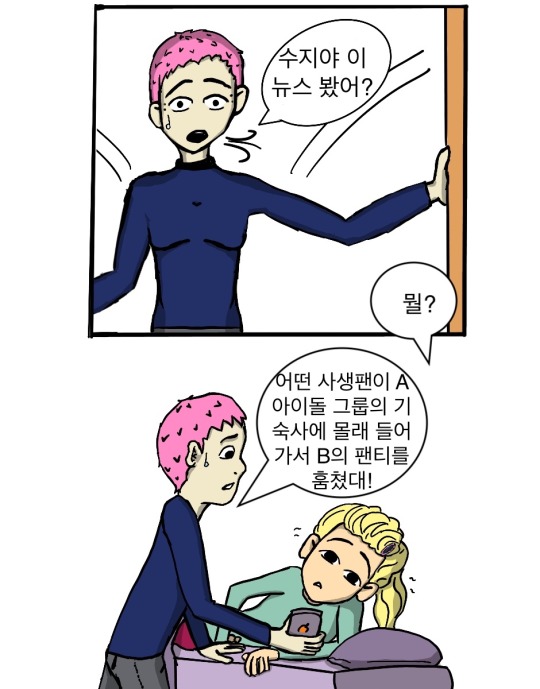

Translation:
수지야 이 뉴스 봤어? Suzie, did you see this (news)?
뭘? What?
어떤 사생팬이 A 아이돌 그룹의 기숙사에 몰래 들어가서 B의 팬티를 훔쳤대! Some stalker fan snuck into A idol’s dorm and stole B’s underwear.
미친…제정신이 아닌가 봐. No f**king way…they’re out of their mind.
Notes
*사생팬
사생(활) is one’s private life. And 팬 is the English loan word for “fan” of an artist or something. Together 사생팬 describes a fan that invades the private life of a star or artist (often to an unbelievable degree) (사생팬: 유명한 사람의 사생활을 침해하는 팬). And with Kpop as crazy as it can be, sometimes fans do unacceptable things like sneaking into a famous celebrities house or stalking them. They can be described as a 사생팬.
*훔쳤대 Someone said someone stole (something)/I heard that someone stole (something)
(V-ㄴ/는대(요) or A-대(요)) is the contracted form of ㄴ/는다고 해(요) and 다고 해(요). This grammar point is for conveying speech that one heard from someone else.
For example:
My mom says it’s okay. 엄마는 괜찮대. (엄마는 괜찮다고 해/했어.)
My sister says she isn’t going. 언니는 안 간대요. (언니는 안 간다고 해요/했어요.)
This contracted form is used all the time in casual speech since it’s shorter. It can be used in the past tense 댔어(요), but it’s used in the present more often. It’s the difference between “My mom says it’s okay” and “My mom said it’s okay.” There really isn’t a huge difference in the message you want to convey.
*팬티
The English loan word panty (팬티) can be used for anyone’s underwear regardless of age or gender. I don’t know about other countries, but I had never heard panty used for underwear that wasn’t for adult women. So, I was a little surprised when I first heard it used for men’s underwear.
*미친
미치다 means to be crazy. And 미친 can be used as an abbreviated way to say that’s crazy/insane or respond to something like “no f–ing way” or “holy shit.” (미쳤다, 미친 사건, 미친 새끼) I’m not quite sure how this abbreviated form came to be, but it’s really common. *I would also like to mention here that 미치다 “to be crazy” is quite a bit more negative in Korean than it is in English. It’s used a lot more often as a curse. It’s can be used lightly among friends, but you should be quite close, as the nuance or intonation could hurt someone’s feelings.
*제정신
제정신 is one’s “right mind.” So, 제정신 아니다 would mean “to not be in one’s right mind.” So, if someone does something that’s kind of crazy or unacceptable, you might be able to use this word. 그 사람이 경찰 앞에서 물건을 훔쳤다고요? 제정신이 아닌가 봐요. (You’re saying) that person stole something right in front of the cops? They’re out of their mind.
I hope you enjoyed this post. Let me know if you have any questions!
It’s been a while since my last post, but I’m going to get back into the rhythm of things!
Follow me for more lessons.^^





